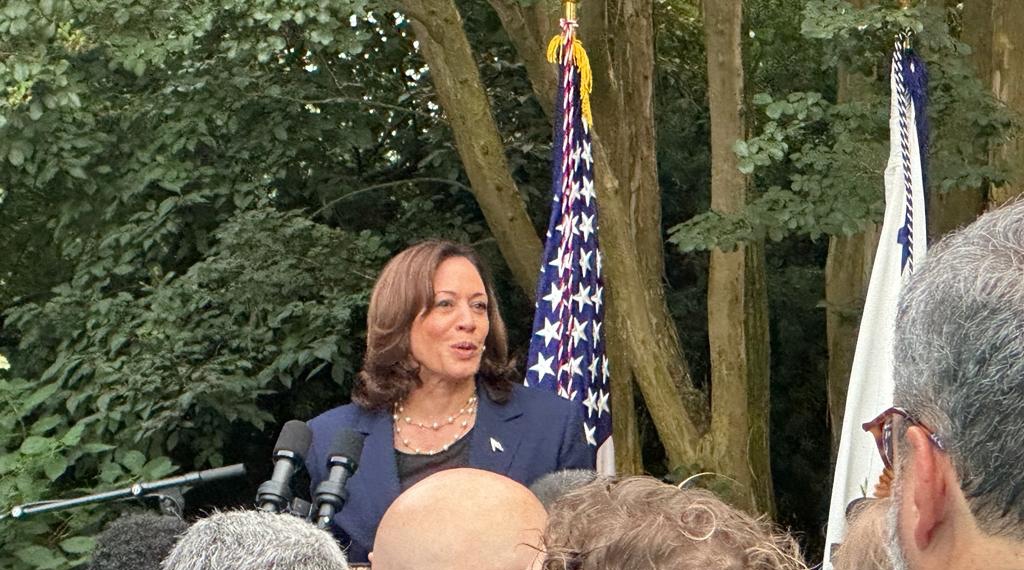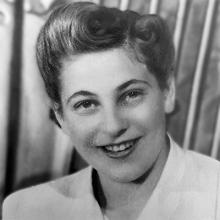Uncategorized
Kamala Harris is No Friend to Israel

By HENRY SREBRNIK A mere days after the Democratic Party leaders pushed President Joe Biden out the door, Kamala Harris, until then a virtual nonentity, was suddenly recast by the so-called “legacy media,” acting in complete lock-step, as a wunderkind bringing the politics of “joy” to America.
That was no surprise. She is a creature of the Democratic Party left and its journalistic enablers, themselves beholden to a woke progressive ideology. And this includes an antipathy – if not worse – to Israel.
For many American Jews, the prospect of Governor Josh Shapiro of Pennsylvania as a running mate for Vice President Kamala Harris prompted elation. He was clearly the candidate who could help the party bring back worried Jewish voters. But not so fast!
Why did Harris go with Minnesota Governor Tim Walz, a man who can’t deliver a swing state, over a young and glib governor who can? There’s only one reason: Jews are no longer allowed on the Democratic presidential ticket. Shapiro is, after all, a “Zionist,” and that wouldn’t do.
Efforts by left-wing and pro-Palestinian activists to derail Shapiro’s nomination – some called him “Genocide Josh” — worked, and it told us just where Harris stood as she made the first significant choice of her candidacy.
The left attacked Shapiro, considering him too sympathetic to Israel. Heeding their warning, she preferred a bland Minnesota liberal governor who will help her far less.
Progressive Democrats were elated. CNN senior political commentator Van Jones said “anti-Jewish bias” may have played a part in the selection of Walz and warned that “antisemitism has gotten marbled into this party.”
Remarked Micah Lasher, a New York City Democrat who is running for that state’s legislature, “There was an inescapable sense the selection had been made into a referendum over Israel.”
We all remember her egregious insult to Prime Minister Benjamin Netanyahu when he addressed the U.S. Senate July 24, an event Harris boycotted. She instead spoke to the Zeta Phi Beta sorority in Indianapolis.
“It is unconscionable to see Vice President Kamala Harris shirk her duties as president of the Senate and boycott this historic event,” stated Victoria Coates, vice president of the Cullom Davis Institute for National Security and Foreign Policy at the Heritage Foundation. “If we can’t stand with Israel now, when can we?”
“I see you. I hear you,” Harris told pro-Hamas demonstrators in Washington during Netanyahu’s visit, as they burned American flags and assaulted police.
On August 7 Harris and Walz met with the leaders of the Uncommitted National Movement in Michigan, a state with a large Arab American population. This is the group that mobilized more than 100,000 people to withhold their votes from President Biden in the Michigan primary last February over his support for Israel.
Founder Layla Elabed reported that Harris “expressed an openness” to meeting with them to discuss an arms embargo against the Jewish state. “Michigan voters right now want a way to support you, but we can’t do that without a policy change that saves lives in Gaza right now,” she told Harris. “Will you meet with us to talk about an arms embargo?”
Elabed explained that Harris wasn’t agreeing to an arms embargo but was open to discussing one “that will save lives now in Gaza and hopefully get us to a point where we can put our support” behind Harris. At a rally in Arizona August 9, Harris told pro-Palestinian demonstrators that “I respect your voices.”
Harris’s presidential campaign subsequently stated that she has “prioritized engaging with Arab, Muslim and Palestinian community members and others regarding the war in Gaza.” She herself had maintained that “We cannot look away in the face of these tragedies. We cannot allow ourselves to become numb to the suffering. And I will not be silent.”
All this led to pushback among some Israel supporters. “Kamala Harris won’t speak with the press. But she will speak with pro-Hamas radicals and suggest she’s open to a full arms embargo against Israel,” Arkansas Republican senator Tom Cotton stated. “Floating an arms embargo against Israel to pro-Hamas activists is disgraceful,” former Secretary of State Mike Pompeo, who served in the Trump administration, added.
“If the group in line with Harris was pro-life and asked for a meeting about banning abortion, she would forcefully say ‘no.’ Don’t tell me it means nothing she said she’s open to an arms embargo on Israel when radical Hamasniks got in line,” declared Richard Goldberg, a senior adviser at the Foundation for Defense of Democracies.
In an interview with the far-left Nation magazine, “Is Kamala the One?”, published July 8, she had already indicated her sympathy for the young people who had mobilized against the war in Gaza and occupied university campuses across the country.
“They are showing exactly what the human emotion should be, as a response to Gaza. There are things some of the protesters are saying that I absolutely reject, so I don’t mean to wholesale endorse their points. But we have to navigate it. I understand the emotion behind it.”
The Biden administration has assembled an interagency team tasked with finding Israeli individuals and groups to sanction, in order to weaken if not topple Netanyahu.
The International Economics Directorate at the National Security Council (NSC) leads the effort. Ilan Goldenberg, who has now become Harris’ liaison to the Jewish community, has played a very enthusiastic role.
Goldenberg, who has served as Harris’s adviser on Middle East issues, has been an acerbic critic of both Netanyahu and the Palestinian leadership.
All this demonstrates that Harris is no friend of Israel. To take another example, her Middle East guru, Philip Gordon, who has served as Harris’s foreign policy adviser since she ran for the White House in 2020, sees and hears no evil emanating from Iran.
Republicans are already demanding the vice president answer why Gordon wrote a string of 2020 opinion pieces together with a Pentagon official, Ariane Tabatabai, who was tied last year to an Iranian government-backed initiative tasked with selling the 2015 nuclear deal to the American public.
“Before joining your office, Mr. Gordon co-authored at least three opinion pieces with Ms. Tabatabai blatantly promoting the Iranian regime’s perspective and interests,” Cotton and New York Representative Elise Stefanik wrote Harris on July 31.
Gordon has argued that the easing of economic sanctions could have allowed Iranian businesses and civil society to better integrate internationally and potentially moderate Tehran’s clerics. He was among the most vocal Democratic critics of former President Donald Trump’s 2018 decision to pull the U.S. out of that landmark nuclear agreement.
But critics have maintained that the loosening of sanctions on Iran has provided Tehran with billions of dollars to fund its terror proxies across the Mideast, leading, among other things, to the Hamas and Hezbollah attacks on Israel, as well as providing the Houthis in Yemen with weapons to strangle Red Sea shipping.
Cotton and Stefanik, in their letter to Harris, asked if Gordon and Tabatabai purposefully spread Iranian disinformation to relieve U.S. pressure on Tehran’s theocratic rulers. “Did you request further investigation into Mr. Gordon when Ms. Tabatabai’s connections to the Iranian Foreign Ministry were revealed in September 2023? Did Mr. Gordon admit and report his ties to this individual?” they wrote. Harris did not reply.
Yet there are Jews who have eyes yet cannot see, so wedded are they to the Democrats. It’s become their ersatz religion. Not long ago the Charlottetown Jewish community hosted a mid-summer event on a beautiful day, which included many of the American summer residents. I was talking to an older man from Massachusetts who said he will (as usual) vote for the Democrat.
I suggested that it should be impossible for any Jew to vote for Harris after she went off to a sorority event in Indiana in July when the prime minister of the embattled Jewish state, suffering a traumatic loss last October and fighting for its survival today, spoke to the United States Senate, where she normally serves as presiding officer. Such a slap in the face would not have been administered to any other head of government.
And not liking Benjamin Netanyahu is no excuse. Would this man not have supported Franklin Roosevelt or Winston Churchill during the Second World War, no matter what he thought of them? Would he have thought Britain and the United States were not worth defending, due to some of their actions during the war? Such excuses really ring hollow. I can understand why Harris favours the Palestinians, both for pragmatic reasons — there are more Muslim votes than Jewish ones — and ideological ones — progressive woke ideology — but do Jews have to go along with this?
(Yes, we know Harris has a Jewish husband. But this is a man who has had little concern with Judaism in his life. His first wife was non-Jewish and neither are his daughters; indeed, one supports anti-Israel protests. A Hollywood entertainment lawyer, he has only now been trotted out as a supposed expert on anti-Semitism, with absolutely no qualifications, so I doubt too many Jews are impressed.)
“Jews for Kamala are Living in Denial,” wrote American playwright, film director, and screenwriter David Mamet on August 9 on the website UnHerd. “Can one imagine a more appallingly calculated slight? Her absence announced that, under her administration, the United States will abandon Israel. And yet American Jews will support her.” We do live in strange times.
Henry Srebrnik is a professor of political science at the University of Prince Edward Island.
Uncategorized
Reza Pahlavi, Iran’s exiled crown prince, has a plan for his people’s future — if they’ll have him

With a U.S.-Israel bombardment underway and President Trump and Prime Minister Benjamin Netanyahu openly pressing for regime change, related questions now loom large: What are the Iranian people prepared for — and who, exactly, is positioned to lead them if the Islamic Republic falls?
Since late 2025, anti-regime protests have spread across Iran, resulting in mass arrests, imprisonments, and thousands killed in crackdowns by regime forces. On January 14, following massive demonstrations, President Donald Trump posted on Truth Social, addressing Iranian protesters: “KEEP PROTESTING – TAKE OVER YOUR INSTITUTIONS!!!… HELP IS ON ITS WAY.” At the time, expectations were high for a U.S. strike on Iran, and thousands of protesters were killed in the streets, hoping that help would come. Now, over a month later, Trump appears to have made good on that promise.
Early on Feb. 28, U.S. and Israeli forces began operating across Iran in what the IDF described as a “close and unprecedented cooperation between the IDF and the US military.” Trump and Netanyahu both made statements indicating that the objective of the joint operation extends beyond military deterrence and toward regime change.
Since the start of the operation, the U.S. and Israel have targeted several sites that go far beyond the aims of the 12-Day War, which primarily focused on degrading Iran’s nuclear and ballistic missile capabilities. In this round of strikes, regime assets and figures have been targeted, including Supreme Leader Ali Khamenei, who was killed by an Israeli strike. During the 12-Day War, the US reportedly instructed Israel not to target the Supreme Leader.
Israeli officials say they eliminated several other top officials, including the commander of the Islamic Revolutionary Guard Corps (IRGC), the commander of the Iranian Armed Forces, the Iranian Minister of Defense, and the head of Iranian Intelligence.
Videos have circulated on social media showing Iranians cheering on the attacks, even as reports indicate that the regime has shut down the internet and is jamming satellite signals from diaspora news channels that would otherwise provide critical information about the strikes.
Chants heard across Iranian cities include“death to Khamenei” and “long live the Shah.” Other videos display Iranians honking their cars and chanting “Azadi,” the Farsi word for freedom, dancing in the streets, and gleefully laughing while watching a plume of smoke rise from Khamenei’s residence.
Still, the killing of senior officials — even the Supreme Leader — does not automatically translate into regime change. Even if Ali Khamanei’s death and that of other senior Iranian officials destabilize the clerical regime, there remain 1 million members of the Revolutionary Guard militia and 200,000 members of the IRGC who play a vital role in propping up the government.
Reza Pahlavi, potential leader?
Former Iranian Crown Prince Reza Pahlavi, who lives in the United States, has emerged as one of the most visible opposition figures.
Since January, videos have surfaced on social media showing Iranian protesters calling for the return of the Pahlavi dynasty, which ruled Iran until the 1979 Islamic Revolution. Videos show demonstrators chanting pro-monarchy slogans or displaying the pre-revolutionary Iranian flag. After Pahlavi publicly called for mass mobilization of protestors earlier this year, the demonstrations escalated, with some protestors holding up photos of him in the streets.

The son of the former Shah, Pahlavi was born in Tehran in 1960. He was formally named Crown Prince at age 7 during his father’s coronation. At 17, he became one of the youngest licensed pilots in Iran before leaving for the US to pursue advanced flight training. While he was abroad, the 1979 Islamic Revolution overthrew his father and abolished the monarchy, turning what was meant to be a temporary study into permanent exile. He has not returned to Iran since.
Today, Pahlavi lives in Maryland with his wife and three daughters, one of whom married a Jewish businessman last summer. He has positioned himself not as a monarch-in-waiting, but as a potential transitional leader. He has repeatedly stated that he does not seek to restore the monarchy, instead advocating for a secular, democratic system. U.S. officials have taken notice: following renewed unrest in January, he reportedly met with Steve Witkoff, top Middle East advisor to Trump.
Behind Pahlavi is a network of advisers drawn largely from the Iranian diaspora, including academics, private-sector executives, and professionals with experience in US government institutions. Some serve in formal roles, while others function as informal advisers. His main organizational platform is the National Union for Democracy in Iran (NUFDI), a Washington-based organization that has for years promoted regime change in Iran with Pahlavi’s support. Under NUFDI, Pahlavi and his team developed the Iran Prosperity Project, a governance blueprint intended to guide the country through a post-Islamic Republic transition.
On the eve of the joint U.S.-Israeli operation, Pahlavi unveiled an updated version of his transitional plan. The document outlines Iran’s urgent priorities during the first six months following a potential regime collapse.
About two hours after the initial strikes in Iran, Pahlavi posted a video to X, encouraging Iranian forces to abandon the regime and telling the Iranian people that he will “announce to you precisely” when they “can return to the streets for the final action.”
His prospects remain contested. Analysts have long questioned whether a figure who has lived outside Iran for nearly five decades can command broad domestic legitimacy. Reliable polling inside Iran is difficult, but Dutch pollster Ammar Maleki has found that roughly one in three Iranians expresses confidence in Pahlavi based on large-sample surveys conducted in recent years. At the same time, a similar proportion strongly oppose him. Nonetheless, Maleki asserts, no other opposition figure approaches his level of name recognition.
Pahlavi is also openly pro-Israel. He has traveled to Israel, prayed at the Western Wall, met with Netanyahu, and advocates for expanding the Abraham Accords into what he calls “Cyrus Accords” between Israel and a future Iran, describing the two nations as the “only two countries on this planet that can claim to have a biblical relationship.” Because of his pro-Israel stance, some detractors frame his potential leadership as aligned more with Western and Israeli interests than with those of the Iranian people.
However, in recent months, experts have increasingly framed him as a viable option — or at least as an integral part of the current protest movement that should not be ignored.
The post Reza Pahlavi, Iran’s exiled crown prince, has a plan for his people’s future — if they’ll have him appeared first on The Forward.
Uncategorized
Iranian Leader Khamenei Killed in Strikes, Israel Says

Iran’s Supreme Leader Ayatollah Ali Khamenei speaks during a meeting in Tehran, Iran, Jan. 3, 2026. Photo: Office of the Iranian Supreme Leader/WANA (West Asia News Agency)/Handout via REUTERS
The United States and Israel launched the most ambitious attack on Iran in decades on Saturday, and Israel said Supreme Leader Ali Khamenei had been killed in the operation.
Khamenei’s body has been found, a senior Israeli official told Reuters. Iranian news agencies Tasnim and Mehr, however, reported that the supreme leader was “steadfast and firm in commanding the field.”
Iran called the strikes unprovoked and illegal and responded with missiles fired at Israel and at least seven other countries, including Gulf states that host U.S. bases.
US President Donald Trump, who made the biggest foreign-policy gamble of his presidency after campaigning for reelection as a “peace president,” said the strikes were aimed at ending a decades-long threat from Iran and ensuring it could not develop a nuclear weapon.
Trump called on Iranian security forces to lay down their weapons and invited Iranians to topple their government once the bombing ended.
The US president later on Saturday told NBC News that “most” of Iran’s senior leadership has been killed. He said he believes reports of Khamenei’s death are accurate. “We feel that that is a correct story,” Trump told NBC News in a phone interview, according to a report on its website.
Israeli Prime Minister Benjamin Netanyahu said there were many signs indicating Khamenei “is no longer” and called on Iranians to finish the job. He said Khamenei’s compound had been destroyed, and Revolutionary Guard commanders and senior nuclear officials had been killed.
Three sources familiar with the matter said Iranian Defense Minister Amir Nasirzadeh and Revolutionary Guards commander Mohammed Pakpour were killed in the Israeli attacks. Iranian media had said Khamenei’s son-in-law and daughter-in-law were also killed.
‘WE ARE TERRIFIED’
In cities across Iran, explosions caused widespread panic.
“We are scared, we are terrified. My children are shaking, we have nowhere to go, we will die here,” mother-of-two Minou, 32, said weeping as she spoke to Reuters by phone from the northern city of Tabriz.
Iran responded by launching missiles at Israel and at several Gulf Arab countries that host US bases.
After confronting hundreds of Iranian missile and drone attacks, the Pentagon said there were no US deaths or injuries.
The US military named the campaign Operation Epic Fury.
Iran issued a warning that the Strait of Hormuz, the narrow passage through which around a fifth of global oil consumption passes, had been closed. Traders expected a sharp jump in oil prices. Airlines canceled flights in the Middle East.
Tehran promised a stronger response to come, with a senior Iranian Revolutionary Guards commander, Ebrahim Jabbari, saying it had so far used only “scrap missiles” and would soon unveil unforeseen weapons.
The U.N. Security Council was due to meet in New York on Saturday. Secretary-General Antonio Guterres called for an immediate cessation of hostilities.
Israel‘s military said some 200 fighter jets had completed the largest flying mission in its history, hitting 500 targets throughout Iran including strategic defense systems already damaged in strikes last year.
A girls’ primary school in the southern Iranian town of Minab was hit, killing 85 people, according to the local prosecutor cited by state media. Reuters could not independently confirm the reports. Israel‘s military did not immediately respond to a request for comment.
TRUMP SAYS ‘BOMBS WILL BE DROPPING EVERYWHERE’
In a video message on social media, Trump cited Washington’s decades-old dispute with Iran and Iranian attacks, dating to the seizure of the US embassy in Tehran during the 1979 Islamic revolution.
Trump said the aim was “eliminating imminent threats from the Iranian regime.” He urged Iranians to stay sheltered because “bombs will be dropping everywhere,” but added: “When we are finished, take over your government. It will be yours to take. This will be probably your only chance for generations.”
But he faced pushback from opposition Democrats, and a few of his fellow Republicans in the US government, who said a prolonged campaign against Iran would be illegal without congressional approval and that lawmakers should vote within days.
Netanyahu said the joint US-Israeli attack “will create the conditions for the brave Iranian people to take their destiny into their own hands” and “remove the yoke of tyranny.”
Iran’s clerical leaders were already in a difficult position after mass anti-government demonstrations in January, which led to a crackdown in which thousands of people were killed in the worst domestic unrest since the era of the 1979 revolution.
Protesters had again taken to the streets in recent days in remembrance of those killed the previous month.
Israeli military operations over the past two years had already killed some of Iran’s senior military officials and severely weakened several of Tehran’s once-feared proxy forces across the Middle East.
After Israel pounded Iran in a 12-day air war in June joined by the United States, the US and Israel had warned that they would strike again if Iran pressed ahead with its nuclear and ballistic missile programs.
The threats were backed up recently by a US military buildup in the region, even as Iranian and US officials held nuclear talks.
Eyal Zamir, the Israeli armed forces chief of staff, said that over the past months, he had been involved in preparing joint battle plans against Iran in coordination with senior leaders in the US military.
MISSILES FIRED AT ARAB GULF STATES
Oil markets have been closely watching the standoff. Jorge Leon, head of geopolitical analysis at Rystad Energy, predicted prices could shoot up by $10-20 per barrel when markets open on Monday, if there is no sign of de-escalation.
Iran, the third-largest producer in the Organization of the Petroleum Exporting Countries, pumps about 4 percent of global oil supplies, and a far larger share is shipped past its coast through the strait leading out of the Gulf.
In Israel, sirens and mobile-phone warnings sent Israelis rushing to air raid shelters as Iran launched a series of missile barrages. There were no immediate reports of serious damage or casualties.
Loud booms sounded in Abu Dhabi, capital of the United Arab Emirates, an oil producer and close US ally, and several blasts were heard in the business capital Dubai, where one of the city’s plush hotel districts was also hit.
Nada AlGarhy, 30, said she and her husband had been at the Waldorf Astoria hotel on Dubai’s luxury Palm development for Iftar, the evening meal during the fasting month of Ramadan, when they heard a loud explosion.
Bahrain said the service center of the US Fifth Fleet – base for American naval forces in the region – had been subjected to a missile attack. Video footage showed a thick grey plume of smoke rising from near the island state’s coastline.
Qatar said it had downed all missiles targeting the country and that it had a right to respond. Kuwait confirmed a missile attack on a US military base there.
Uncategorized
Before I became an orthodontist, I was my good friend Neil Sedaka’s saxophonist

When I first heard Neil Sedaka had died at the age of 86, I posted a Sedaka song on social media. I’m a Gen-X alternative rock fan, which is not exactly Sedaka’s lane, but it’s hard not to tip your hat to a pop culture legend. I posted “Standing on the Inside,” from 1973, and told people to wait for the chorus. Then, in the comments, my friend Beth Tichler Mindes from my Camp Tranquility summer camp days, wrote a sentence that stopped me: Neil and her dad had been in a band together when they were teens in the Catskills. She’d known Neil her whole life. I asked if I could talk to her 86-year-old father, Howie Tichler, and when I got him on the phone, he told me about the time in the spring of 1958 when he first met Neil Sedaka.
I first met Neil at the Kingsway Theatre on Kings Highway in Brooklyn. I was standing in the back near the popcorn. He was next to me, wearing a high school band sweater. I asked him what school he went to, and I told him I was a musician too. He said he was a piano player and that his band was auditioning for a saxophone player for a Catskills summer gig. I said, great, I’m in. It was that quick. He told me to come down to the basement and audition.
Honestly, I was at the theater to meet girls, not to watch the movie. That’s why I was hanging out in the back.
Before the audition, I spoke to my uncle, Sid Cooper. He was a saxophonist and woodwind player with the Tommy Dorsey band and later at NBC, playing with the Tonight Show band during the Jack Paar years and into the Johnny Carson era. He made sure I was ready. I needed a rhumba, a cha-cha, a foxtrot, a jitterbug. In those days you had to know the dances.

The audition was for a four-piece band. Neil wasn’t even the leader. He was just the piano player. The job was in the Catskills, at a hotel in Monticello called the Esther Manor. Esther ran the place, and her daughter, Leba Strassberg, worked behind the front desk. Neil would later marry Leba.
I don’t remember exactly how we got there. Maybe my father drove. Maybe someone in the group had a car. But we packed everything in and drove up.
When we arrived, we were told to introduce ourselves to the owner using only our first names. Half the band was Italian. In most places in the 1950s, people were hiding Jewish heritage. In the Catskills, Italian last names apparently wouldn’t go down so well. So, Eddie Caccavale became just Eddie. Paul Delova became Paul.
There were sometimes four of us, sometimes five. The group was called The Nordanels. My name wasn’t in the title because I joined a little late. The name came from Norman, David, and Neil. N-O-R-D-A-N-E-L-S.
If it was a wedding or a bar mitzvah, we wore white tuxedos. Sometimes black. At the hotels, it depended on the night of the week.
We worked six days a week, and this is no exaggeration. Afternoons, we played poolside for cha-cha lessons. Then we’d run back to our rooms, change, and play in the lobby as guests came in for dinner. After that, we played dance music before the stage show, then read the charts for the acts — usually, a dance team, a singer, or a comedian.
I was making about $85 a week, plus room and board. I wouldn’t exactly call it a room as I slept near the chicken coops. We didn’t get tips, either — unless you count being seated at dinner with the single girls.
I was born in 1939, so you can do the math. I was 18 when I started at Brooklyn College. By 1961, I was headed to Temple University in Philadelphia for dental school.

The Catskills gig helped pay for all of it as I could save every summer. Brooklyn College tuition was $15 a year, and they even threw in the textbooks. Dental school was another story. So the band gig felt like a gift.
People think of Dirty Dancing when you say Catskills. That came later. The movie is set in 1963, at a fictional resort called Kellerman’s. But the atmosphere was already there in the late 50’s and early 60’s. It was smoky. It was loud. It was hopeful.
At Esther Manor, single girls came up with their parents for the summer, and at dinner they would sometimes seat the musicians with the guests. So there we were, night after night, at long tables with our instruments nearby. We were in heaven. So were the girls.
I did this for six or seven summers. It wasn’t a one-time gig. I kept playing through my third year of dental school. After Carol and I were married, and I graduated, that era ended. From then on, I focused on dentistry. I’m a retired orthodontist, and I practiced on Long Island for about 45 years, and now I teach at Columbia. We originally lived on Long Island near my practice. My wife became a social worker and psychotherapist and opened a practice in Manhattan, so we moved halfway to the city. Once the kids flew the coop, we moved into Manhattan.
During the pandemic, we did something that still makes me laugh. Back when everything was masks, masks, masks, Carol and I were stuck in our apartment one day, and we wrote new parody lyrics to one of Neil’s songs. The original was “Breaking Up Is Hard to Do.” We turned it into “Masking Is Not Hard to Do.” I called Neil and told him we’d written these lyrics, and I emailed them over.
“Don’t take your mask away from me.
Don’t put my health in jeopardy.
If you don’t, then I’ll be blue,
Because what I am asking is not hard to do.
Remember when you held me tight.
We can’t do that now, but that’s all right.
Thinking safe will get us through,
Because masking is not hard to do.
They say that masking up is a difficult task.”
The next day we found out he’d posted it on Facebook. During the pandemic, he was doing this daily thing where he would sing three songs, and he introduced us and said we wrote the lyrics, and then he played it.
I guess I wasn’t so shocked when I heard he died, as when I spoke to him about a week ago, he was frailer than I ever heard him. But when we talked, we were right back to music.
We always talked about gigs we did together, about musicians who were on the job, and about little details he might have forgotten. For example, the last time we spoke, just two weeks ago, he said, you know that album I recorded that wasn’t very successful, where I sang a bunch of standards? I said sure, I remember it; I still have it. And he said, who was the piano player on that gig?
Our conversations were brief on family, and then we’d get into the details of the cool things we did together. It was always a walk down memory lane.
What I truly admired about Neil was his humility. He understood the unspoken thing between musicians. He knew my limitations, and he never judged my playing. He also knew I was an orthodontist. I had patients, not jam sessions. I wasn’t able to keep up my chops the way a full-time musician could, and he never made me feel like I was anything less than part of the band.
About 15 years ago, Neil called me up and said, “I’m on tour, and I have a gig at the Shubert Theatre in New Haven. My saxophone player is stuck in Montreal. Can you come do the show with me?”
I said, “Sure, but you realize you’re asking an orthodontist to sit in with an eight-piece orchestra.”
He said, “No problem. I’ll fax you the music.” Fax. That’s how long ago this was.
So the music starts flying through my fax machine, half of it unreadable. I called Neil and said, “I’m doing the gig, but don’t expect me to be reading those charts. I’m going to do it by ear.” And he said, “Great.”
I drove up the night before because we had soundcheck the next afternoon. The band was there, Neil wasn’t even there yet, one of the other musicians was running the rehearsal. I’m standing in this magnificent old theater in the middle of New Haven, and I walked up to the guys and said, “Hi, I’m Howie Tichler. I’m really an orthodontist. So go easy on me.” And the guy says, “Neil told us everything. Don’t worry about a thing. Come on up. We’ll rehearse.”
They put me right behind Neil, so the spotlight wasn’t only on him. It was on me, too. The air conditioning was blasting, and it kept blowing my sheet music off the stand, so I’m trying to keep the pages from taking flight while also pretending I belong there.
Neil was incredibly gracious. He introduced the band and he said, “This is my friend Howie Tichler, who is really an orthodontist, and he came to help me out.”
And when I left the theater, I’m walking out with my saxophone on my shoulder, and a woman stopped me and said, “Can I talk to you for a second?” I thought she was going to compliment my playing.
Instead she asked me if she needed braces.
Right now, I’m mostly thinking about the good times. Whenever he came to Manhattan we’d meet up. We went to museums together — the Met, the Guggenheim. It wasn’t always about music. Sometimes it was just two old friends walking around looking at art.
He also came to visit us on Fire Island. Within half an hour, everyone in Fair Harbor knew he was at our house. Not because of an announcement, because of his voice. We had a little portable piano, and he’d sit down and sing. Someone walking by would hear it, stop, and then word would spread.
I actually sang on his first hit, “The Diary.” It’s a doo-wop song, and they couldn’t afford, or maybe couldn’t find, backup singers, so I became the backup singer on Neil Sedaka’s first record.
But the thing I keep coming back to isn’t the credit. It’s the sound of him in the room, that voice carrying out the window. In Fair Harbor you could hear him before you saw him.
The post Before I became an orthodontist, I was my good friend Neil Sedaka’s saxophonist appeared first on The Forward.






